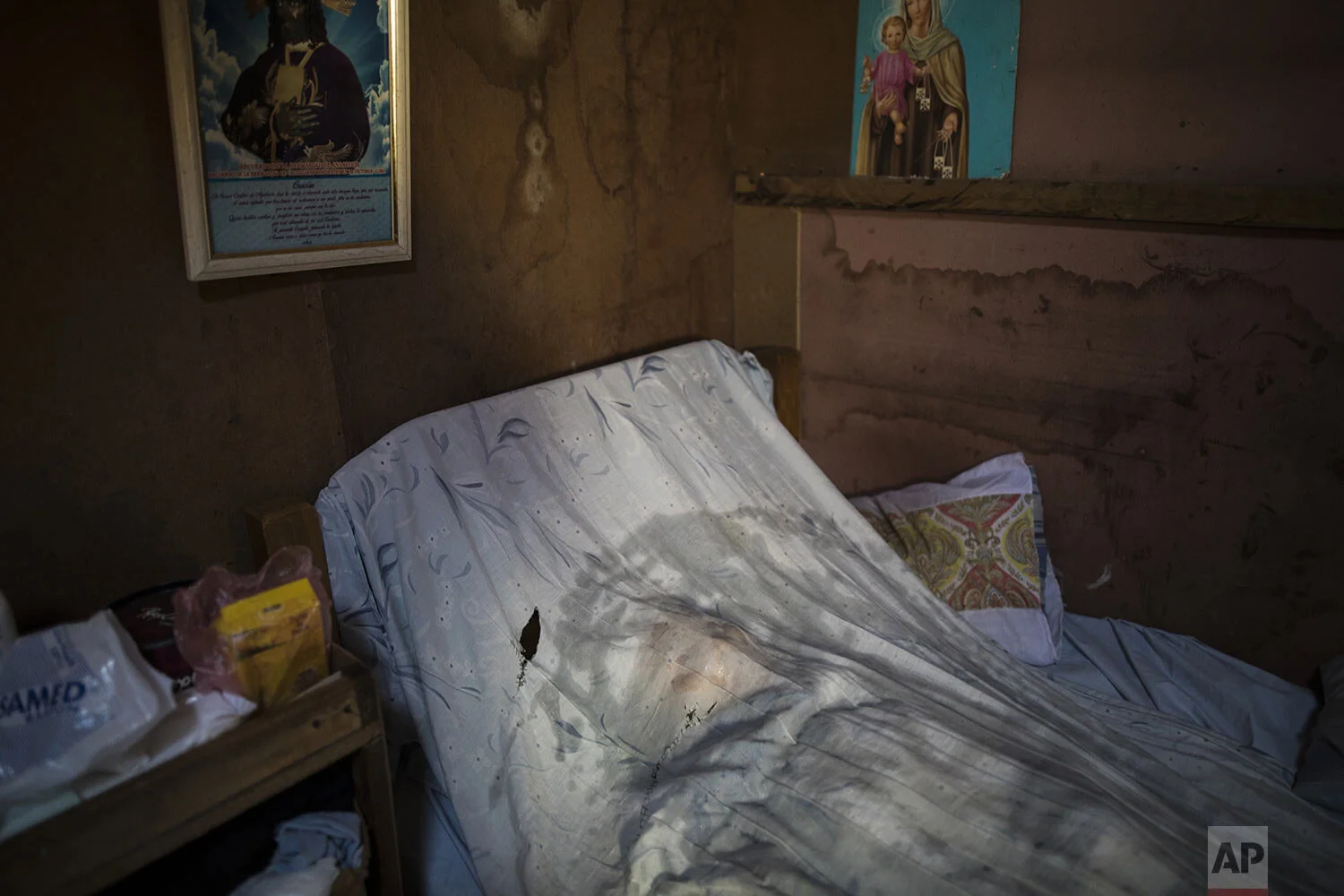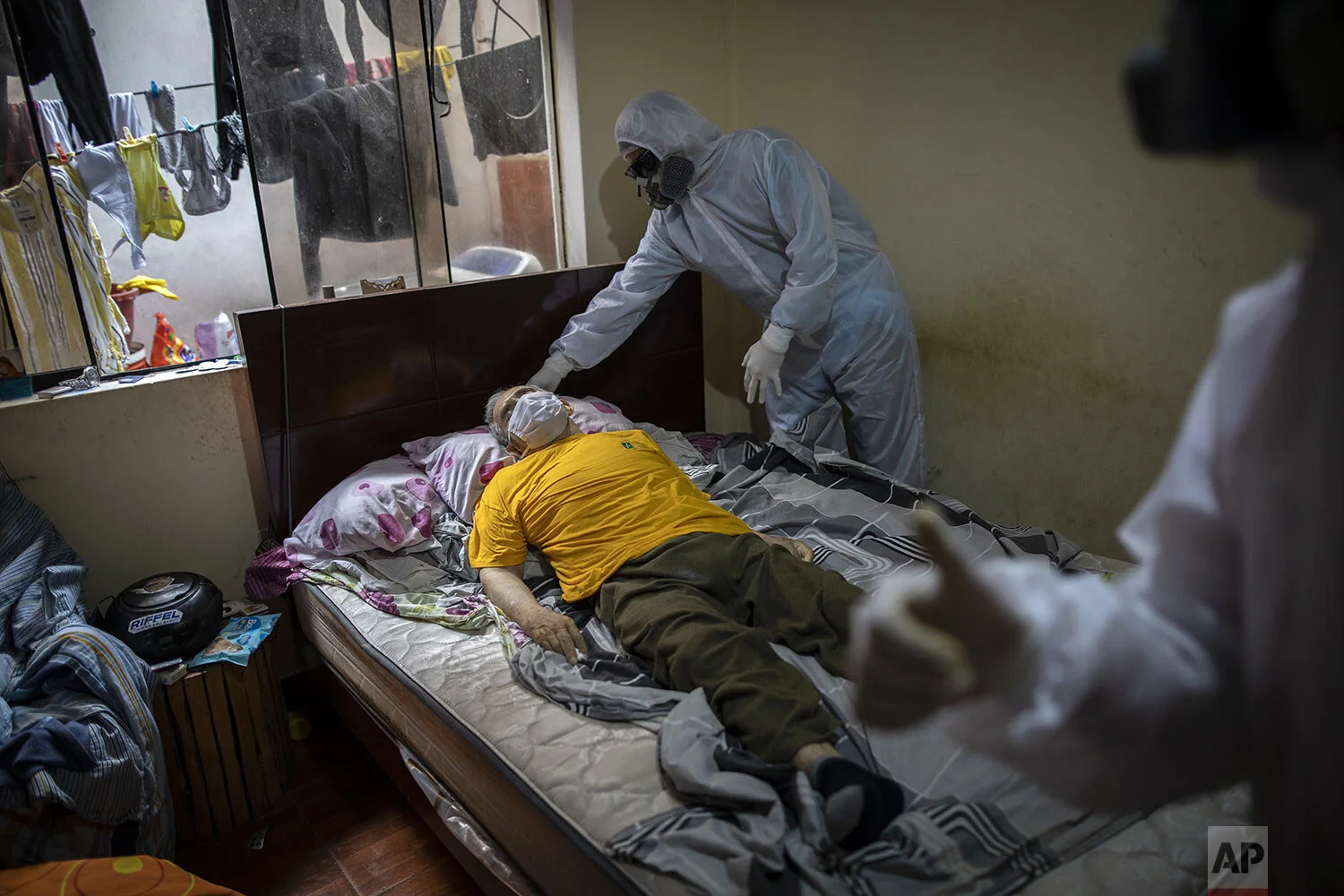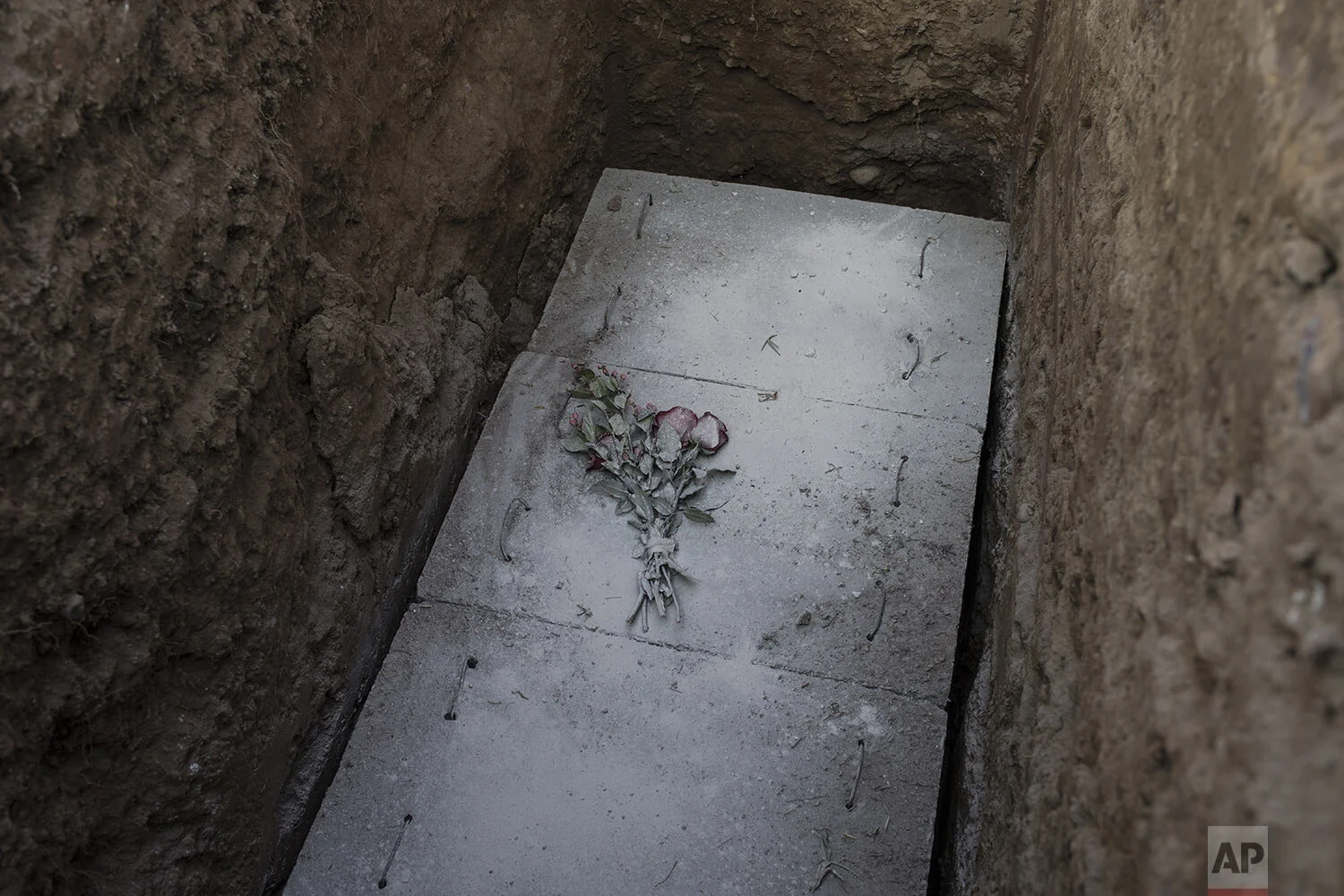As virus swamps Peru, Venezuelan migrants collect the dead

Faustino López was terrified after his wife, Angélica, was hospitalized with the coronavirus last month.
Deeply shaken by seeing her so seriously ill after 45 years of marriage, and worried about falling sick himself, López moved from their bed to the living room couch, and wept as he watched news of the pandemic spreading through Peru. Then he lost his sense of taste and began to shiver with fever. A test came back positive for the virus.
Depressed and fearful, López tried to check himself into a government center for coronavirus patients, according to his two children. A guard turned him away because he hadn’t been correctly referred.
The 68-year-old gardener went home, drank muriatic acid and hanged himself in his living room with a yellow extension cord.
Piedrangel funeral home worker Luis Zerpa, of Venezuela, arrives to remove the body of 68-year-old Faustino Lopez who is believed to have committed suicide after learning that he tested positive for the new coronavirus, in Lima, Peru, May 5, 2020. (AP Photo/Rodrigo Abd)
López’s body remained there, the police afraid to touch it, until a gray Hyundai hearse pulled up. Jhoan Faneite and his stepson, Luis Zerpa, stepped out, wrapped in protective gear and toting a body bag and disinfectant.
Despite strict measures to control the coronavirus, this South American nation of 32 million people has become one of the countries worst hit by the COVID-19 disease. With more than 104,000 cases and 3,000 deaths, Peru was 12th in the world in numbers of confirmed diagnoses Wednesday, more than reported by China and just behind India.
The true scope of the disaster is even worse. With more than half of cases going uncounted, according to some doctors’ estimates, Peruvian officials call the coronavirus pandemic the most devastating to hit the country since 1492, when Europeans began bringing diseases like smallpox and measles to the Americas.
Peruvians are dying at home by the hundreds. In the capital, Lima, the grueling, dangerous work of recovering bodies from homes falls to Faneite, Zerpa and fellow workers from the Piedrangel funeral home, who, clad in full-body orange suits, face masks and goggles to protect themselves, collect as many as 10 bodies a day.
On this afternoon earlier this month, Zerpa began by stripping López and washing down his body with disinfectant as Faneite looked over the 68-year-old’s identity card and other official documents.
A week later, López’s wife, Angélica, died of coronavirus in a hospital.
“Every day I entrust myself to God so that I don’t catch the disease,” said Faneite, who worked as an electrician in his native Venezuela before migrating to Peru in 2018 with his wife and stepson amid his home country’s years-long economic crisis.
Six days a week, Faneite, Zerpa and some of the roughly 20 other Venezuelan funeral workers drive hearses through wealthy neighborhoods overlooking the Pacific Ocean as well as through poor areas on hillsides that don’t have running water.
Marcos Epinoza, a 51-year-old electrician, lived in a working-class neighborhood near Pachacámac, the site of an Inca temple. Suffering from diabetes, he began drinking an infusion of eucalyptus, ginger and lemon when he felt pain in his eyes earlier this month.
He died in his sleep a week later, just before 3 a.m. on May 8.
Eight hours later, Faneite, Zerpa and another Venezuelan crew member, Luis Brito, walked uphill to his house, only their eyes visible through their protective gear. They hauled him in a body bag by hand, pausing to rest the corpse in the dirt on the steep descent back to the hearse.
The Piedrangel funeral home says it collected the first person confirmed to have died of COVID-19 in Peru, a psychologist who died alone in March in his apartment overlooking the ocean.
When other funeral homes refused to pick up the body, Edgard Gonzales, who owns the funeral home with his three brothers, saw opportunity.
“A door could open here,” he remembers telling them. Piedrangel cremates all COVID-19 victims.
Piedrangel funeral home workers Jhoan Faneite and Luis Brito, both of Venezuela, remove the body of an 85-year-old retired carpenter who is suspected to have died from complications due to the new coronavirus, in the Chorrillos neighborhood of Lima, Peru, May 4, 2020. (AP Photo/Rodrigo Abd)
Piedrangel funeral home workers Alexander Carballo, left, Luis Brito, right, both of Venezuela, and Peruvian Martín Aguila, arrive in the El Augustino neighborhood to remove the body of a resident suspected to have died from the new coronavirus, in Lima, Peru, May 4, 2020. (AP Photo/Rodrigo Abd)
A neighbor restrains his barking dog as a team of Piedrangel funeral home workers arrive to remove the body of a 51-year-old electrician suspected to have died of the new coronavirus, in a working-class neighborhood near Pachacamac, the site of an Inca temple, on the outskirts if Lima, Peru, May 8, 2020. (AP Photo/Rodrigo Abd)
Ricardo Noriega, a 77-year-old clothing salesman, felt ill in late April and couldn’t find a taxi or a relative to take him to a hospital. He died in an armchair in his living room about a week later, facing a wall hung with family photos.
Zerpa and two other colleagues wrapped Noriega in a body bag and carried him out to the hearse.
When soldiers and police stop the Piedrangel hearse to demand its travel permit, many recoil when informed it is carrying a likely COVID-19 victim.
More than 5,000 police officers have been diagnosed with the disease, with 92 deaths, out of a force of roughly 100,000. The army has suffered lower levels of the disease.
Faneite says he has personally handled more than 400 COVID-19 deaths since March.
When he returns home to his sleeping wife and two young children, Faneite undresses in silence, showers and washes his clothes with sodium hypochlorite disinfectant. Sometimes, he gargles with salt water.
He says he must stay healthy for his family, including his elderly parents who remain in Venezuela.
”You have to take care of yourself,” he says. “Before they go, before the inevitable happens, I want see them again.”
Text from AP News story As virus swamps Peru, Venezuelan migrants collect the dead by Franklin Briceno and Rodrigo Abd.
Photos by Rodrigo Abd




























